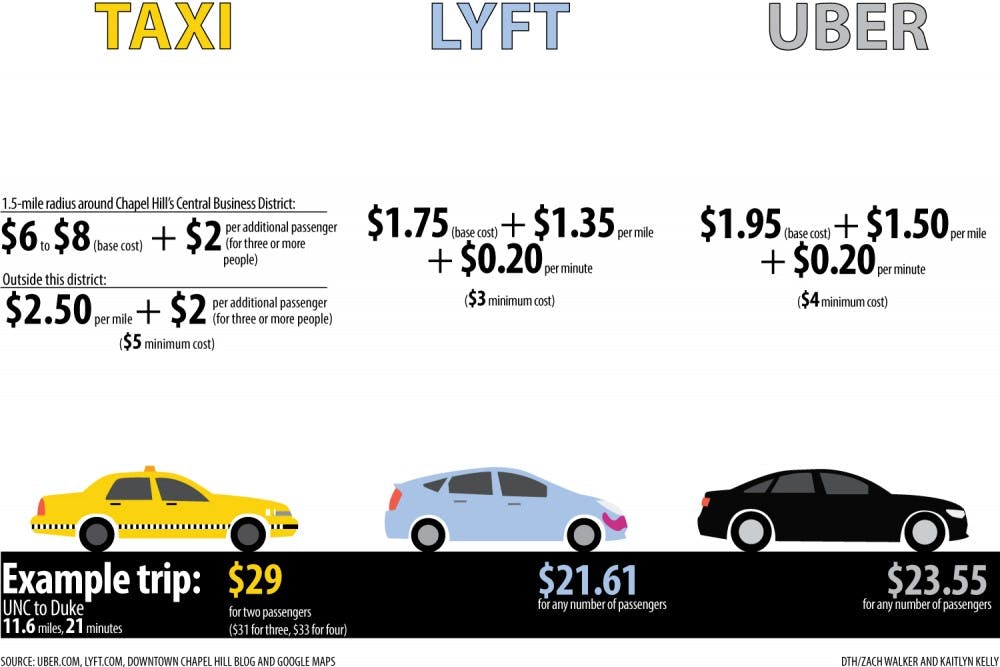“Regulating Uber like a transportation company is like regulating Expedia or Orbitz like an airline,” Bennett said. “They connect consumers to airlines and hotels, but they don’t own planes and hotel chains.”
Uber drivers are not technically hired by the company but are considered independent contractors. Drivers are paid weekly based on the number and length of the rides they give. They use their own vehicles when driving.
“When you request a ride, you get the driver’s name, photo, license plate and vehicle make and model, and you also get the driver’s rating,” he said. “The whole experience is of greater quality and more comfortable than your typical taxi experience.”
What’s the issue?
Taxi companies and taxi drivers across the United States have protested that Uber and companies like it use their status as technology companies to avoid transportation regulations.
More than a dozen cities and states have issued cease and desist warnings to Uber and Lyft in the past year, as well as warnings to consumers. The Raleigh-Durham International Airport has issued warnings to Uber drivers without permits to operate there.
“They come in, they’re not paying anything, but all the taxi drivers, they’re paying everything,” said Raleigh taxi driver Ricky Rogers.
Flora Parrish, records supervisor for the Town of Chapel Hill, said taxi drivers and companies in Chapel Hill have to undergo criminal fingerprint checks, abide by the flat-rate policy and pay for permits and inspections. Parrish said there’s not much Chapel Hill can do to regulate companies like Uber.
“The state says because they’re digital dispatch, they fall under something different. You don’t have to make any phone contact — it’s all through the app,” she said.
Joel Smith, owner of Chapel Hill’s Mr. Taxi, worries that Uber and Lyft drivers do not have to have the same insurance as taxi drivers.
“The first time there’s a wreck and there’s no insurance to cover everybody, that’s when people will pay attention,” he said.
In January, 6-year-old Sophia Liu was killed by an Uber driver in California while the driver had no passenger in the car. The company initially declined to provide insurance coverage, according to media reports.
To get the day's news and headlines in your inbox each morning, sign up for our email newsletters.
“These companies are popular, and they’re cheaper than taxi companies because they’re not paying the same costs,” said Dave Sutton, spokesman for Who’s Driving You, an advocacy organization for the Taxicab, Limousine & Paratransit Association.
“This cheapness is a result of their underinvestment in public safety costs.”
How Uber regulates
Bennett said in North Carolina, Uber insures its drivers up to $1.5 million in commercial liability insurance when a passenger is in the car. If no passenger is in an Uber driver’s car and an accident occurs, each person involved is insured for $50,000, up to $100,000 total.
He said Uber also performs thorough background checks and responds quickly to negative feedback about its drivers.
“We do a rigorous three-tiered background check that leads the industry — local, multi-state and federal checks, that checks sex offender lists, violent crimes and driving records,” he said.
Bennett said Uber cars can be no more than 10 years old, must have four doors and must be in excellent condition. He said Uber is not anti-regulation, but he disagrees with current rules.
“Ordinances like minimum fares or owning a certain number of vehicles in a fleet—that makes it very prohibitive.”
North Carolina state policy on digital dispatch car services may change following a review by the Revenue Laws Study Committee, to be reported to the N.C. General Assembly in 2015.
Parrish said cities across the state have had issues with Uber, and she hopes the state will take notice.
“Eventually what’s going to happen is (taxi drivers) are going to think, ‘Why do we have to follow the rules when they’re not?’”
city@dailytarheel.com




